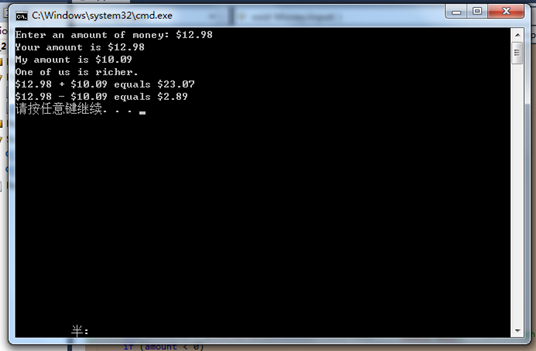操作符重载就是把操作符(比如'+,-,*,/'这些运算符)赋于新的意义。
C++有许多内置的数据类型,包括int,char,double等,每一种类型都有许多运算符,例如加,减,乘,除等。当用户定义了类的对象时,两个对象之间是不能进行这些操作的,比如定义一个Money类的对象,它有元和角两个变量,对象a的属性是5元5角,对象b的属性是3元7角,总共是9元2角。但是a+b,这样的语句如果没有重载+运算符就会出错。你需要重新定义+的功能,使其按照你定义的规则进行处理。可以先把a对象的5元5角化成55角,b化成37角,然后以角为单位相加。加完之后再化成元角的形式返回给对象。
#include <iostream>
#include <cstdlib>
#include <cmath>
using namespace std;
//Class for amounts of money in U.S. currency.
class Money
{
public:
Money( );
Money(double amount);
Money(int dollars, int cents);
Money(int dollars);
double getAmount( ) const;
int getDollars( ) const;
int getCents( ) const;
void input( ); //Reads the dollar sign as well as the amount number.
void output( ) const;
const Money operator +(const Money& amount2) const;
const Money operator -(const Money& amount2) const;
bool operator ==(const Money& amount2) const;
const Money operator -( ) const;
private:
int dollars; //A negative amount is represented as negative dollars and
int cents; //negative cents. Negative $4.50 is represented as -4 and -50
int dollarsPart(double amount) const;
int centsPart(double amount) const;
int round(double number) const;
};
int main( )
{
Money yourAmount, myAmount(10, 9);
cout << "Enter an amount of money: ";
yourAmount.input( );
cout << "Your amount is ";
yourAmount.output( );
cout << endl;
cout << "My amount is ";
myAmount.output( );
cout << endl;
if (yourAmount == myAmount)
cout << "We have the same amounts.\n";
else
cout << "One of us is richer.\n";
Money ourAmount = yourAmount + myAmount;
yourAmount.output( ); cout << " + "; myAmount.output( );
cout << " equals "; ourAmount.output( ); cout << endl;
Money diffAmount = yourAmount - myAmount;
yourAmount.output( ); cout << " - "; myAmount.output( );
cout << " equals "; diffAmount.output( ); cout << endl;
return 0;
}
/* 第一个const表示Money为常量类型,第二个const表示不改变调用实参,第二个const表示不改变调用对象*/
const Money Money::operator +(const Money& secondOperand) const
{
int allCents1 = cents + dollars*100;
int allCents2 = secondOperand.cents + secondOperand.dollars*100;
int sumAllCents = allCents1 + allCents2;
int absAllCents = abs(sumAllCents); //Money can be negative.
int finalDollars = absAllCents/100;
int finalCents = absAllCents%100;
if (sumAllCents < 0)
{
finalDollars = -finalDollars;
finalCents = -finalCents;
}
return Money(finalDollars, finalCents);
}
const Money Money::operator -(const Money& secondOperand) const
{
int allCents1 = cents + dollars*100;
int allCents2 = secondOperand.cents
+ secondOperand.dollars*100;
int diffAllCents = allCents1 - allCents2;
int absAllCents = abs(diffAllCents);
int finalDollars = absAllCents/100;
int finalCents = absAllCents%100;
if (diffAllCents < 0)
{
finalDollars = -finalDollars;
finalCents = -finalCents;
}
return Money(finalDollars, finalCents);
}
bool Money::operator ==(const Money& secondOperand) const
{
return ((dollars == secondOperand.dollars)
&& (cents == secondOperand.cents));
}
const Money Money::operator -( ) const
{
return Money(-dollars, -cents);
}
Money::Money( ): dollars(0), cents(0)
{/*Body intentionally empty.*/}
Money::Money(double amount)
: dollars(dollarsPart(amount)), cents(centsPart(amount))
{/*Body intentionally empty*/}
Money::Money(int theDollars)
: dollars(theDollars), cents(0)
{/*Body intentionally empty*/}
//Uses cstdlib:
Money::Money(int theDollars, int theCents)
{
if ((theDollars < 0 && theCents > 0) || (theDollars > 0 && theCents < 0))
{
cout << "Inconsistent money data.\n";
exit(1);
}
dollars = theDollars;
cents = theCents;
}
double Money::getAmount( ) const
{
return (dollars + cents*0.01);
}
int Money::getDollars( ) const
{
return dollars;
}
int Money::getCents( ) const
{
return cents;
}
//Uses iostream and cstdlib:
void Money::output( ) const
{
int absDollars = abs(dollars);
int absCents = abs(cents);
if (dollars < 0 || cents < 0)//accounts for dollars == 0 or cents == 0
cout << "$-";
else
cout << '$';
cout << absDollars;
if (absCents >= 10)
cout << '.' << absCents;
else
cout << '.' << '0' << absCents;
}
//Uses iostream and cstdlib:
void Money::input( )
{
char dollarSign; //先输入美元符号'$'
cin >> dollarSign; //hopefully
if (dollarSign != '$')
{
cout << "No dollar sign in Money input.\n";
exit(1);
}
double amountAsDouble; //再输入钱数
cin >> amountAsDouble;
dollars = dollarsPart(amountAsDouble); //分别取得美元和美分部分
cents = centsPart(amountAsDouble);
}
int Money::dollarsPart(double amount) const
{
return static_cast<int>(amount); //向下取整 <int>(2.9)为2 截断取整
}
int Money::centsPart(double amount) const
{
double doubleCents = amount*100;
int intCents = (round(fabs(doubleCents)))%100;// 负数用%会出错 can misbehave on negatives 取余数
if (amount < 0)
intCents = -intCents;
return intCents;
}
int Money::round(double number) const //四舍五入取整,const不改变调用对象number,
{
return static_cast<int>(floor(number + 0.5));
}























 1065
1065











 被折叠的 条评论
为什么被折叠?
被折叠的 条评论
为什么被折叠?








